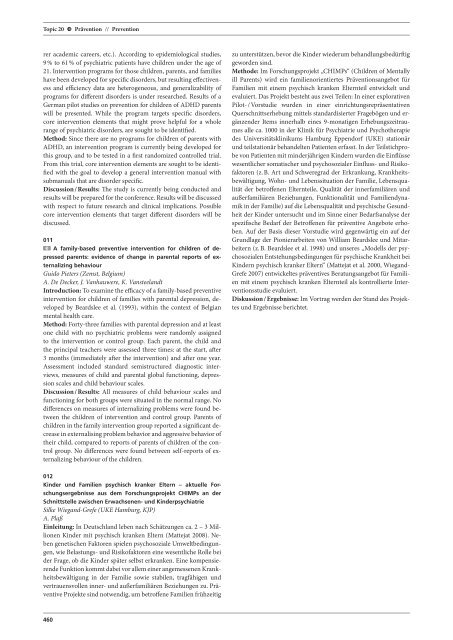Psychische Erkrankungen in der Lebensspanne ... - DGPPN
Psychische Erkrankungen in der Lebensspanne ... - DGPPN
Psychische Erkrankungen in der Lebensspanne ... - DGPPN
Sie wollen auch ein ePaper? Erhöhen Sie die Reichweite Ihrer Titel.
YUMPU macht aus Druck-PDFs automatisch weboptimierte ePaper, die Google liebt.
Topic 20 G Prävention // Prevention<br />
rer academic careers, etc.). Accord<strong>in</strong>g to epidemiological studies,<br />
9 % to 61 % of psychiatric patients have children un<strong>der</strong> the age of<br />
21. Intervention programs for those children, parents, and families<br />
have been developed for specific disor<strong>der</strong>s, but result<strong>in</strong>g effectiveness<br />
and efficiency data are heterogeneous, and generalizability of<br />
programs for different disor<strong>der</strong>s is un<strong>der</strong> researched. Results of a<br />
German pilot studies on prevention for children of ADHD parents<br />
will be presented. While the program targets specific disor<strong>der</strong>s,<br />
core <strong>in</strong>tervention elements that might prove helpful for a whole<br />
range of psychiatric disor<strong>der</strong>s, are sought to be identified.<br />
Method: S<strong>in</strong>ce there are no programs for children of parents with<br />
ADHD, an <strong>in</strong>tervention program is currently be<strong>in</strong>g developed for<br />
this group, and to be tested <strong>in</strong> a first randomized controlled trial.<br />
From this trial, core <strong>in</strong>tervention elements are sought to be identified<br />
with the goal to develop a general <strong>in</strong>tervention manual with<br />
submanuals that are disor<strong>der</strong> specific.<br />
Discussion / Results: The study is currently be<strong>in</strong>g conducted and<br />
results will be prepared for the conference. Results will be discussed<br />
with respect to future research and cl<strong>in</strong>ical implications. Possible<br />
core <strong>in</strong>tervention elements that target different disor<strong>der</strong>s will be<br />
discussed.<br />
011<br />
A family-based preventive <strong>in</strong>tervention for children of depressed<br />
parents: evidence of change <strong>in</strong> parental reports of externaliz<strong>in</strong>g<br />
behaviour<br />
Guido Pieters (Zemst, Belgium)<br />
A. De Decker, J. Vanhauwere, K. Vansteelandt<br />
Introduction: To exam<strong>in</strong>e the efficacy of a family-based preventive<br />
<strong>in</strong>tervention for children of families with parental depression, developed<br />
by Beardslee et al. (1993), with<strong>in</strong> the context of Belgian<br />
mental health care.<br />
Method: Forty-three families with parental depression and at least<br />
one child with no psychiatric problems were randomly assigned<br />
to the <strong>in</strong>tervention or control group. Each parent, the child and<br />
the pr<strong>in</strong>cipal teachers were assessed three times: at the start, after<br />
3 months (immediately after the <strong>in</strong>tervention) and after one year.<br />
Assessment <strong>in</strong>cluded standard semistructured diagnostic <strong>in</strong>terviews,<br />
measures of child and parental global function<strong>in</strong>g, depression<br />
scales and child behaviour scales.<br />
Discussion / Results: All measures of child behaviour scales and<br />
function<strong>in</strong>g for both groups were situated <strong>in</strong> the normal range. No<br />
differences on measures of <strong>in</strong>ternaliz<strong>in</strong>g problems were found between<br />
the children of <strong>in</strong>tervention and control group. Parents of<br />
children <strong>in</strong> the family <strong>in</strong>tervention group reported a significant decrease<br />
<strong>in</strong> externalis<strong>in</strong>g problem behavior and aggressive behavior of<br />
their child, compared to reports of parents of children of the control<br />
group. No differences were found between self-reports of externaliz<strong>in</strong>g<br />
behaviour of the children.<br />
012<br />
K<strong>in</strong><strong>der</strong> und Familien psychisch kranker Eltern – aktuelle Forschungsergebnisse<br />
aus dem Forschungsprojekt CHIMPs an <strong>der</strong><br />
Schnittstelle zwischen Erwachsenen- und K<strong>in</strong><strong>der</strong>psychiatrie<br />
Silke Wiegand-Grefe (UKE Hamburg, KJP)<br />
A. Plaß<br />
E<strong>in</strong>leitung: In Deutschland leben nach Schätzungen ca. 2 – 3 Millionen<br />
K<strong>in</strong><strong>der</strong> mit psychisch kranken Eltern (Mattejat 2008). Neben<br />
genetischen Faktoren spielen psychosoziale Umweltbed<strong>in</strong>gungen,<br />
wie Belastungs- und Risikofaktoren e<strong>in</strong>e wesentliche Rolle bei<br />
<strong>der</strong> Frage, ob die K<strong>in</strong><strong>der</strong> später selbst erkranken. E<strong>in</strong>e kompensierende<br />
Funktion kommt dabei vor allem e<strong>in</strong>er angemessenen Krankheitsbewältigung<br />
<strong>in</strong> <strong>der</strong> Familie sowie stabilen, tragfähigen und<br />
vertrauensvollen <strong>in</strong>ner- und außerfamiliären Beziehungen zu. Präventive<br />
Projekte s<strong>in</strong>d notwendig, um betroffene Familien frühzeitig<br />
460<br />
zu unterstützen, bevor die K<strong>in</strong><strong>der</strong> wie<strong>der</strong>um behandlungsbedürftig<br />
geworden s<strong>in</strong>d.<br />
Methode: Im Forschungsprojekt „CHIMPs“ (Children of Mentally<br />
ill Parents) wird e<strong>in</strong> familienorientiertes Präventionsangebot für<br />
Familien mit e<strong>in</strong>em psychisch kranken Elternteil entwickelt und<br />
evaluiert. Das Projekt besteht aus zwei Teilen: In e<strong>in</strong>er explorativen<br />
Pilot- / Vorstudie wurden <strong>in</strong> e<strong>in</strong>er e<strong>in</strong>richtungsrepräsentativen<br />
Querschnittserhebung mittels standardisierter Fragebögen und ergänzen<strong>der</strong><br />
Items <strong>in</strong>nerhalb e<strong>in</strong>es 9-monatigen Erhebungszeitraumes<br />
alle ca. 1000 <strong>in</strong> <strong>der</strong> Kl<strong>in</strong>ik für Psychiatrie und Psychotherapie<br />
des Universitätskl<strong>in</strong>ikums Hamburg Eppendorf (UKE) stationär<br />
und teilstationär behandelten Patienten erfasst. In <strong>der</strong> Teilstichprobe<br />
von Patienten mit m<strong>in</strong><strong>der</strong>jährigen K<strong>in</strong><strong>der</strong>n wurden die E<strong>in</strong>flüsse<br />
wesentlicher somatischer und psychosozialer E<strong>in</strong>fluss- und Risikofaktoren<br />
(z. B. Art und Schweregrad <strong>der</strong> Erkrankung, Krankheitsbewältigung,<br />
Wohn- und Lebenssituation <strong>der</strong> Familie, Lebensqualität<br />
<strong>der</strong> betroffenen Elternteile, Qualität <strong>der</strong> <strong>in</strong>nerfamiliären und<br />
außerfamiliären Beziehungen, Funktionalität und Familiendynamik<br />
<strong>in</strong> <strong>der</strong> Familie) auf die Lebensqualität und psychische Gesundheit<br />
<strong>der</strong> K<strong>in</strong><strong>der</strong> untersucht und im S<strong>in</strong>ne e<strong>in</strong>er Bedarfsanalyse <strong>der</strong><br />
spezifische Bedarf <strong>der</strong> Betroffenen für präventive Angebote erhoben.<br />
Auf <strong>der</strong> Basis dieser Vorstudie wird gegenwärtig e<strong>in</strong> auf <strong>der</strong><br />
Grundlage <strong>der</strong> Pionierarbeiten von William Beardslee und Mitarbeitern<br />
(z. B. Beardslee et al. 1998) und unseres „Modells <strong>der</strong> psychosozialen<br />
Entstehungsbed<strong>in</strong>gungen für psychische Krankheit bei<br />
K<strong>in</strong><strong>der</strong>n psychisch kranker Eltern“ (Mattejat et al. 2000, Wiegand-<br />
Grefe 2007) entwickeltes präventives Beratungsangebot für Familien<br />
mit e<strong>in</strong>em psychisch kranken Elternteil als kontrollierte Interventionsstudie<br />
evaluiert.<br />
Diskussion / Ergebnisse: Im Vortrag werden <strong>der</strong> Stand des Projektes<br />
und Ergebnisse berichtet.


